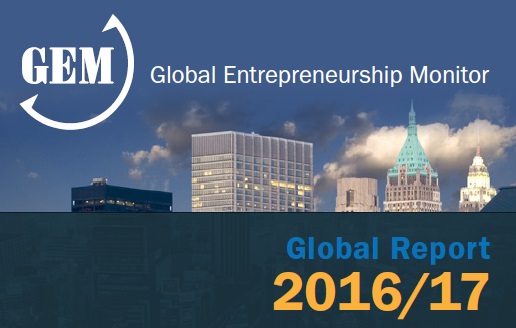Fifty-five percent of entrepreneurs worldwide expect to create at least one job in the next five years - this according to the GEM 2016/17 Global Report released today with sponsors Babson College, Universidad Del Desarrollo, Universiti Tun Abdul Razak, and Tecnológico de Monterrey.
Yet globally, many factors are in play that could hinder such entrepreneurial growth. These include sophisticated technologies and communications that may enable entrepreneurs to operate on their own, rigid labour regulations, poor availability of skilled or educated labour, limited access to entrepreneurial finance, and the decision to stay small to avoid the complexities of formalisation.
GEM countries in the 2016 survey cover 69.2 per cent of the world’s population and 84.9 per cent of the world’s GDP. In its 18th consecutive year, the report continues to serve as the largest single study of entrepreneurs in the world.
Key Findings of the Latest GEM Report
Over the past year, entrepreneurial activity remained stable or increased in approximately two-thirds of all economies surveyed in both 2015 and 2016. Average Total Early Stage Entrepreneurial Activity (TEA) rates (measured as the percentage of individuals aged 18-64 who are either a nascent entrepreneur or owner-manager of a new business) tend to be highest in factor-driven economies, decreasing with higher levels of economic development (17 per cent in factor-driven and 9 per cent in innovation-driven).
Regionally, TEA rates are highest in Latin America and the Caribbean and in Africa. In both regions, roughly one-fifth of adults are engaged in early-stage entrepreneurial activity. Europe reports the lowest regional TEA rates, with three of the four lowest rates in this region. Italy, Germany and Bulgaria all fall below 5 per cent.
Innovation levels in an economy also tend to track the level of economic development. Regionally, innovation intensity is highest in North America at 39 per cent and lowest in Africa at 20 per cent.

However, several economies show an encouraging trend of high TEA rates coupled with robust levels of innovation. Chile is a leader in this respect, where 24 per cent of the adult population are starting or running a new business and of these, 57 per cent stated that they are introducing innovative products or services.
The report finds a strong link between levels of entrepreneurship and perceptions of entrepreneurship as being a positive career choice – also that this is affected by the type and frequency of media coverage of entrepreneurs. Sixty per cent of entrepreneurs in all regions believe entrepreneurs receive positive media attention. Among the highest levels reported are in China, Thailand, and Indonesia, where more than three-fourths of adults see positive media attention for entrepreneurs, Greece, India, and Mexico report around half this level. In India and Mexico, this is consistent with low beliefs about entrepreneurship as a good career choice and high status for entrepreneurs (less than 50 per cent for both indicators).
Jamaica reports the highest levels of media attention (87 per cent), consistent with its strongly positive perceptions about entrepreneurship (85 per cent).
According to Mike Herrington, Executive Director of GEM, the GEM 2016/2017 Global Report aims to provide academics, educators, policy makers, and practitioners with key insights into the interdependency between entrepreneurship and economic development, by
- Uncovering factors that encourage or hinder entrepreneurial activity, especially related to societal values, personal attributes, and the entrepreneurship ecosystem;
- Providing a platform for assessing the extent to which entrepreneurial activity influences economic growth within individual economies; and
- Uncovering policy implications for the purpose of enhancing entrepreneurial capacity in an economy.
“There is little doubt that evidence-based policy decisions can help to create a nourishing entrepreneurial environment that benefits entrepreneurs in all phases of their businesses that will ultimately help build more resilient economies,” said Herrington.
He adds that GEM recognises that there is no one-size-fits-all solution for promoting entrepreneurship across the globe. However, the report offers some suggestions that could serve as a basis for discussion about policies and practices that might support entrepreneurs and promote greater impact on their societies. As part of its commitment to distilling the lessons of entrepreneurship for individual countries, GEM also launched a series of policy briefs today that focus on specific policy influences on entrepreneurship in 37 economies featured in the report.

